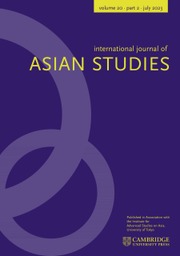Article contents
Turkic Typologies: Ideology and Indigenous Linguistic Knowledge in the Work of Bekir Çobanzade
Published online by Cambridge University Press: 21 July 2020
Abstract
The current work is an exploration of the life and linguistic scholarship of the Crimean Tatar linguist Bekir Çobanzade. In it, I pay particular attention to the impact of the author's socio-political environment, especially the rise of Stalinism, on his works relating to the history and classification of the Turkic languages. I demonstrate how these circumstances compelled Çobanzade to perform an intellectual migration, from an indigenous Turkic ontology focused on the structural wholeness of the Turkic languages to a rigid application of Marxist-Leninist concepts of socially-determined linguistic classification. I do this with the help of monographs and journal articles published in Crimean Tatar, Ottoman Turkish, Azerbaijani and Russian, problematizing the multitude of his audiences and loyalties. As such, Çobanzade's story becomes a microcosm of the experience of a broader generation of Turkic writers and scholars. It was a generation that sought to take the greatest benefit from the monumental changes following World War I, and ended up being consumed by the totalitarian state that emerged in its wake. Çobanzade is one victim of many whose scholarly oeuvre can open a window to a heady and bygone period of experimentation and change.
Keywords
- Type
- Research Article
- Information
- Copyright
- Copyright © The Author(s), 2020. Published by Cambridge University Press
References
- 1
- Cited by



